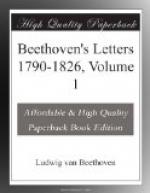Nos. 18 and 23] be still alive, beg him in my name
to describe my malady, and to add these pages to the
analysis of my disease, that at least, so far as possible,
the world may be reconciled to me after my death.
I also hereby declare you both heirs of my small fortune
(if so it may be called). Share it fairly, agree
together and assist each other. You know that
anything you did to give me pain has been long forgiven.
I thank you, my brother Carl in particular, for the
attachment you have shown me of late. My wish
is that you may enjoy a happier life, and one more
free from care, than mine has been. Recommend
Virtue to your children; that alone, and not
wealth, can ensure happiness. I speak from experience.
It was
Virtue alone which sustained me in my
misery; I have to thank her and Art for not having
ended my life by suicide. Farewell! Love
each other. I gratefully thank all my friends,
especially Prince Lichnowsky and Professor Schmidt.
I wish one of you to keep Prince L——’s
instruments; but I trust this will give rise to no
dissension between you. If you think it more beneficial,
however, you have only to dispose of them. How
much I shall rejoice if I can serve you even in the
grave! So be it then! I joyfully hasten to
meet Death. If he comes before I have had the
opportunity of developing all my artistic powers,
then, notwithstanding my cruel fate, he will come too
early for me, and I should wish for him at a more
distant period; but even then I shall be content,
for his advent will release me from a state of endless
suffering. Come when he may, I shall meet him
with courage. Farewell! Do not quite forget
me, even in death; I deserve this from you, because
during my life I so often thought of you, and wished
to make you happy. Amen!
LUDWIG VAN BEETHOVEN.
(Written on the Outside.)
Thus, then, I take leave of you, and with sadness
too. The fond hope I brought with me here, of
being to a certain degree cured, now utterly forsakes
me. As autumn leaves fall and wither, so are my
hopes blighted. Almost as I came, I depart.
Even the lofty courage that so often animated me in
the lovely days of summer is gone forever. O Providence!
vouchsafe me one day of pure felicity! How long
have I been estranged from the glad echo of true joy!
When! O my God! when shall I again feel it in
the temple of Nature and of man?—never?
Ah! that would be too hard!
(Outside.)
To be read and fulfilled after my death by my brothers
Carl and Johann.
[Footnote 1: This beautiful letter I regret not
to have seen in the original, it being in the possession
of the violin virtuoso Ernst, in London.
I have adhered to the version given in the Leipzig
Allgemeine Musikalische Zeitung, Oct. 1827.]
[Footnote 2: A large portion of the Eroica
was written in the course of this summer, but not
completed till August, 1804.]




